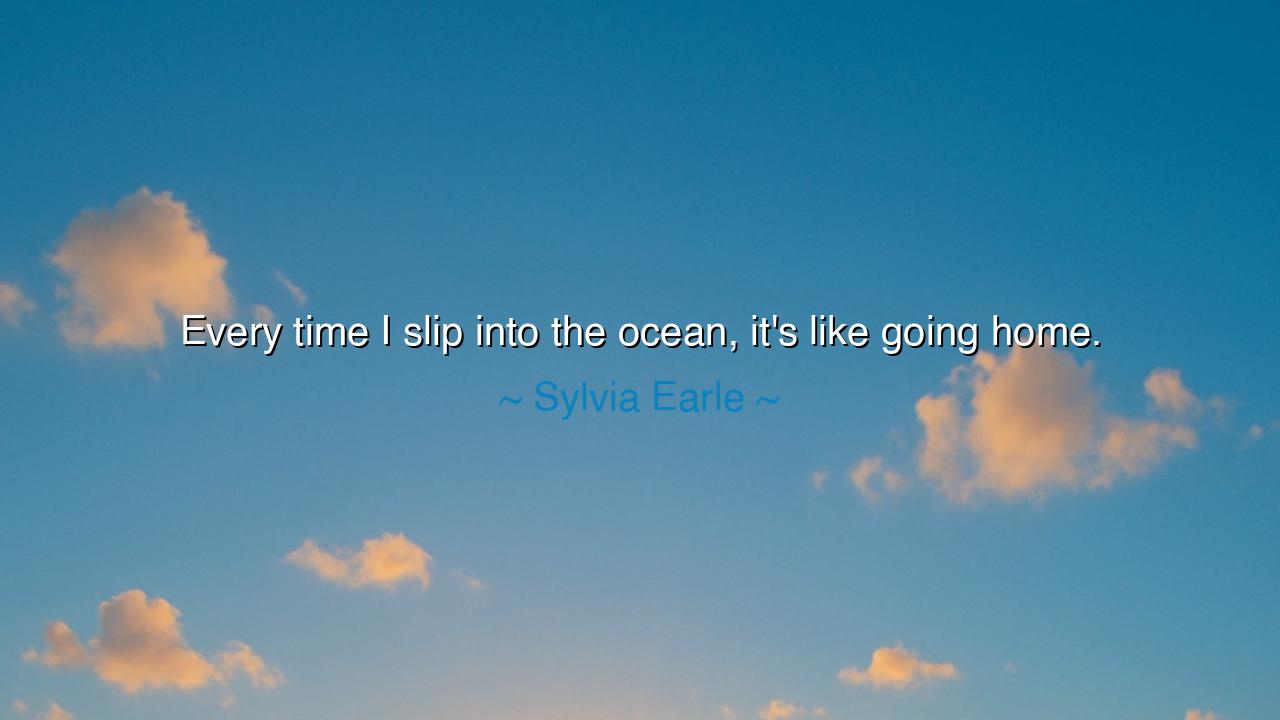
Every time I slip into the ocean, it's like going home.






The words of Sylvia Earle — “Every time I slip into the ocean, it's like going home.” — flow like a hymn to the ancient mother of life. They are simple, yet they carry the weight of eons, echoing the memory written in every drop of our blood. For in truth, before humankind walked upon the earth, it swam — our ancestors were born of salt and tide, nurtured in the vast womb of the ocean. To enter the sea is to return to the beginning, to touch again the source from which all breathing things have come. Thus, when Earle speaks of “going home,” she speaks not of geography, but of origin — of returning to the embrace of the element that birthed us, sustained us, and still calls to us in dreams.
Sylvia Earle, known as “Her Deepness,” is not merely a scientist but a pilgrim of the deep. For decades, she has explored the ocean’s heart — descending into its shadowed realms, witnessing its beauty, and sounding the alarm of its fragility. Her words arise not from theory, but from communion. To her, the sea is not a foreign wilderness, but a sanctuary — a place where the noise of human striving falls silent, and the eternal rhythms of life speak in waves and currents. “Going home,” for her, is a spiritual recognition: that the ocean is not outside of us, but within us — that its pulse beats in our veins, its salt in our tears, its mystery in our souls.
Since the dawn of civilization, the wise have revered the sea as both creator and destroyer, mother and mirror. The Greeks told of Poseidon, whose trident ruled the waters; the Polynesians sang of Tangaroa, god of the ocean who fathered all life. Even the poets of old, gazing upon the horizon, felt the pull of something eternal — the same call that stirs in Earle’s heart. For the sea holds the memory of creation itself. To slip beneath its surface is to be reborn into silence, to float once more in the cradle of existence. There, in the gentle sway of the current, one feels the truth of Earle’s words: the ocean is home because it is the origin of being.
Consider the story of Jacques Cousteau, another explorer of the deep, whose life too was dedicated to understanding the ocean’s soul. When he first dived with the aqualung — that simple device that allowed man to breathe beneath the waves — he wrote of the overwhelming peace he felt, as though entering another world untouched by time. “We forget our age,” he said, “and become children again.” Like Earle, he understood that beneath the waves lies something that transcends science: a reconnection to innocence, a cleansing of the spirit. To know the ocean is to remember what it means to belong — not to nations or names, but to life itself.
Earle’s words also carry a warning. If the ocean is our home, then its suffering is our own. Today, its depths are wounded by pollution, its coral cities pale with death, its creatures silenced by the hunger of mankind. To return “home” to the ocean should not only fill us with wonder, but with responsibility. For who would destroy the walls of their own house? Who would poison the well from which their children must drink? To love the sea, as Earle does, is to protect it — not out of duty, but out of reverence for what it truly is: the beating heart of the planet, the cradle of every breath we take.
The deeper meaning of her words, then, is both personal and universal. When she says, “Every time I slip into the ocean, it’s like going home,” she speaks for all who have ever stood by the shore and felt their soul quiet in the sound of waves. Home, in this sense, is not a fixed place, but a state of belonging to the whole of creation. To feel at home in the sea is to remember that life is one — that every raindrop, every living creature, every human heart shares a common origin in the waters of the world. It is to realize that we are not masters of the earth, but its children.
So let this be your lesson: seek to return home — not only to the ocean, but to the awareness of your place within nature. Walk by the shore with gratitude; touch the water with respect; let the wind remind you of your smallness and your sacredness. Protect the seas as you would your family, for they are your family. When you breathe, give thanks to the unseen forests beneath the waves that make your breath possible. And when life grows loud or heavy, return — in body or in spirit — to the water, and listen. For the ocean will speak as it spoke to Sylvia Earle, whispering softly through the tides: You have come home.






AAdministratorAdministrator
Welcome, honored guests. Please leave a comment, we will respond soon